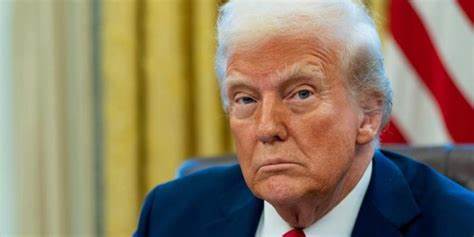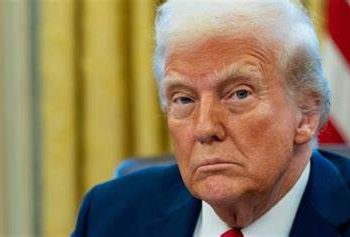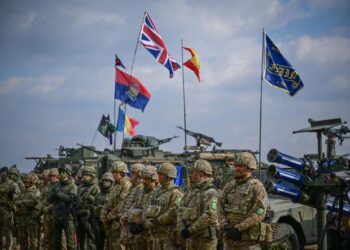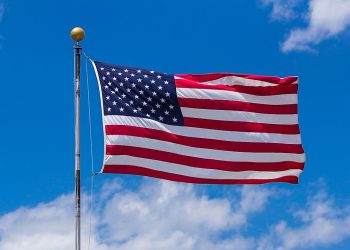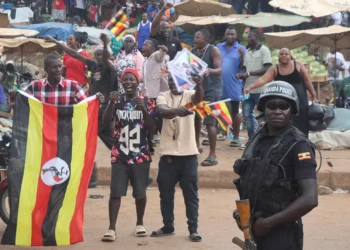United States President Donald Trump has doubled down on threats of military intervention in Nigeria, explicitly refusing to exclude either airstrikes or the deployment of ground forces to stop what he describes as the systematic killing of Christians by Islamic extremists.
In a video address delivered on Wednesday from behind the presidential seal, Trump issued his most detailed warning yet about potential American military action, saying Washington would take steps that Nigeria “is not going to be happy about” if violence against Christians continues.
“If the Nigerian government continues to allow the killing of Christians, the USA will immediately stop all aid assistance to Nigeria. We are going to do things to Nigerians that Nigeria is not going to be happy about and may very well go into that now disgraced country, guns-a-blazing to completely wipe out the Islamic terrorists who are committing these horrible atrocities,” Trump declared in the recorded message.
The American President has formally instructed the Department of War to begin preparations for potential military operations, warning that any strikes would be executed with maximum force and minimal warning.
“I am hereby instructing the Department of War to prepare for possible actions. If we attack, it is going to be vicious and sweet just as the terrorist thugs attack our cherished Christians. The Nigerian government had better move fast before it is too late,” Trump stated, setting an ominous deadline for Nigerian authorities to act.
The video message, which represents an escalation from Trump’s initial designation of Nigeria as a “country of particular concern” on October 31, frames the situation as a crisis of existential proportions for Christian communities in Africa’s most populous nation.
“Christianity is facing an existential threat in Nigeria. Thousands and thousands of Christians are being killed. Radical Islamists are responsible for this mass slaughter,” the President said, painting a picture of widespread religious persecution that Nigerian authorities vehemently dispute.
Trump has mobilized the legislative branch to support his position, directing Congressman Riley Moore and Congressman Tom Cole, chairman of the House Appropriations Committee, to launch an immediate investigation into the allegations and report their findings directly to him.
“I am asking congressman Riley Moore, together with chairman Tom Cole and the house appropriations committee, to immediately look into this matter and report back to me,” Trump said, signaling that Congressional action may follow any executive measures.
Beyond the threat of military force, the President made clear that economic consequences would be immediate and severe. He announced that all American aid and assistance to Nigeria would be suspended immediately if the alleged killings persist, potentially cutting off millions of dollars in development funding, security cooperation, and humanitarian programs.
Trump positioned the threatened intervention as part of a broader American commitment to defending Christian communities globally, suggesting that Nigeria may not be the only country facing potential consequences.
“The United States cannot stand by while such atrocities are happening in Nigeria and numerous other countries… We stand ready, willing, and able to save our great Christian population around the world,” he declared, hinting at a wider doctrine of religious protection that could see American forces deployed to multiple locations.
The escalating rhetoric from Washington comes despite consistent denials from Nigerian authorities that Christians are being systematically targeted. President Bola Tinubu’s government has maintained that violence in various parts of the country affects citizens of all religious backgrounds and stems from terrorism, banditry, and criminal activity rather than religious persecution.
The Nigerian government has also received backing from China, which on Tuesday condemned what Beijing described as American interference in Nigeria’s internal affairs under the guise of human rights concerns.
Trump’s willingness to explicitly mention both airstrikes and ground operations marks a significant departure from typical diplomatic language and raises serious questions about American respect for Nigerian sovereignty. Any unilateral military action without Nigerian consent or United Nations authorization would constitute a violation of international law and could set a dangerous precedent for relations between Western powers and African nations.
The threat has already triggered widespread concern across the African continent, with analysts warning that American military intervention could destabilize the entire West African region and damage relations between Africa and the West for years to come.
As tensions mount, the international community awaits clarity on whether Trump’s threats represent serious policy planning or diplomatic pressure tactics designed to force changes in Nigerian security operations. Either way, the unprecedented nature of the warnings has created the most serious bilateral crisis between Nigeria and the United States in modern history.

